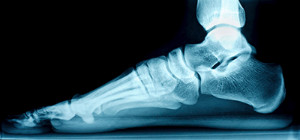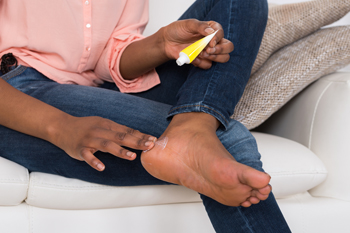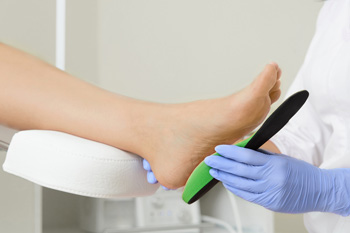
 Flat feet are a common condition in which the feet lack a visible arch in the sole when weight is placed on them. There are several telltale signs of flat feet. The first is overpronation, an abnormal gait in which your feet roll inwards when you walk. If you have an overpronated gait, you may notice that the soles of your shoes wear more quickly along the inner border. Other signs of flat feet include having feet that point slightly outward when you walk or stand, pain in the joints of your lower limbs, hips, and lower back, and pain in the arch of the foot. If you are experiencing discomfort due to flat feet, please see a podiatrist for treatment.
Flat feet are a common condition in which the feet lack a visible arch in the sole when weight is placed on them. There are several telltale signs of flat feet. The first is overpronation, an abnormal gait in which your feet roll inwards when you walk. If you have an overpronated gait, you may notice that the soles of your shoes wear more quickly along the inner border. Other signs of flat feet include having feet that point slightly outward when you walk or stand, pain in the joints of your lower limbs, hips, and lower back, and pain in the arch of the foot. If you are experiencing discomfort due to flat feet, please see a podiatrist for treatment.
Flatfoot is a condition many people suffer from. If you have flat feet, contact Dr. Edward D. Hutson from Easton, PA. . Our doctor will treat your foot and ankle needs.
What Are Flat Feet?
Flatfoot is a condition in which the arch of the foot is depressed and the sole of the foot is almost completely in contact with the ground. About 20-30% of the population generally has flat feet because their arches never formed during growth.
Conditions & Problems:
Having flat feet makes it difficult to run or walk because of the stress placed on the ankles.
Alignment – The general alignment of your legs can be disrupted, because the ankles move inward which can cause major discomfort.
Knees – If you have complications with your knees, flat feet can be a contributor to arthritis in that area.
Symptoms
Treatment
If you are experiencing pain and stress on the foot you may weaken the posterior tibial tendon, which runs around the inside of the ankle.
If you have any questions please feel free to contact our offices located in Easton, and Northampton, PA . We offer the newest diagnostic and treatment technologies for all your foot and ankle needs.
 Cracked heels are a common foot problem. The skin on the heels can become thick and can begin to peel and crack, possible causing severe pain and discomfort. There are specific reasons why cracked heels may develop. These can consist of having a thyroid disorder, fungal infection, or diabetes. Additionally, patients who are overweight, or have skin conditions including psoriasis or eczema may be prone to getting cracked heels. Cracked heels may be prevented by wearing shoes that have a closed back, and it may help to refrain from standing on hard surfaces for the majority of the day. There are many types of treatments for cracked heels, and it is suggested that you seek the counsel of a podiatrist who can choose the correct treatment for you.
Cracked heels are a common foot problem. The skin on the heels can become thick and can begin to peel and crack, possible causing severe pain and discomfort. There are specific reasons why cracked heels may develop. These can consist of having a thyroid disorder, fungal infection, or diabetes. Additionally, patients who are overweight, or have skin conditions including psoriasis or eczema may be prone to getting cracked heels. Cracked heels may be prevented by wearing shoes that have a closed back, and it may help to refrain from standing on hard surfaces for the majority of the day. There are many types of treatments for cracked heels, and it is suggested that you seek the counsel of a podiatrist who can choose the correct treatment for you.
If the skin on your feet starts to crack, you may want to see a podiatrist to find treatment. If you have any concerns, contact Dr. Edward D. Hutson from Easton, PA. . Our doctor can provide the care you need to keep you pain-free and on your feet.
Cracked Heels
It is important to moisturize your cracked heels in order to prevent pain, bleeding, and infection. The reason cracked heels form is because the skin on the foot is too dry to support the immense pressure placed on them. When the foot expands, the dry skin on the foot begins to split.
Ways to Help Heal Them
Ways to Prevent Cracked Heels
If you are unsure how to proceed in treating cracked heels, seek guidance from a podiatrist. Your doctor will help you with any questions or information you may need.
If you have any questions, please feel free to contact our offices located in Easton, and Northampton, PA . We offer the newest diagnostic and treatment technologies for all your foot care needs.
 Orthotics are shoe inserts made in order to relieve pain resulting from a foot condition such as corns and calluses, tendonitis, bunions, heel pain, or recurring stress fractures. Orthotics can be made of a variety of materials that include rubber, plastic, leather or even metal. While many orthotics can be purchased over the counter, they can also be custom made by a podiatrist for a specific issue. A podiatrist will account for the function and structure of the foot as well as its biomechanics to help determine what the best fit is for each patient. Patients who are interested in getting orthotics should consult with their podiatrist, who will be able to either prescribe custom orthotics or suggest which over the counter orthotics will work best.
Orthotics are shoe inserts made in order to relieve pain resulting from a foot condition such as corns and calluses, tendonitis, bunions, heel pain, or recurring stress fractures. Orthotics can be made of a variety of materials that include rubber, plastic, leather or even metal. While many orthotics can be purchased over the counter, they can also be custom made by a podiatrist for a specific issue. A podiatrist will account for the function and structure of the foot as well as its biomechanics to help determine what the best fit is for each patient. Patients who are interested in getting orthotics should consult with their podiatrist, who will be able to either prescribe custom orthotics or suggest which over the counter orthotics will work best.
If you are having discomfort in your feet and would like to try orthotics, contact Dr. Edward D. Hutson from Easton, PA. . Our doctor can provide the care you need to keep you pain-free and on your feet.
What Are Orthotics?
Orthotics are inserts you can place into your shoes to help with a variety of foot problems such as flat feet or foot pain. Orthotics provide relief and comfort for minor foot and heel pain but can’t correct serious biomechanical problems in your feet.
Over-the-Counter Inserts
Orthotics come in a wide variety of over-the-counter inserts that are used to treat foot pain, heel pain, and minor problems. For example, arch supports can be inserted into your shoes to help correct overarched or flat feet, while gel insoles are often used because they provide comfort and relief from foot and heel pain by alleviating pressure.
Prescription Orthotics
If over-the-counter inserts don’t work for you or if you have a more severe foot concern, it is possible to have your podiatrist prescribe custom orthotics. These high-quality inserts are designed to treat problems such as abnormal motion, plantar fasciitis, and severe forms of heel pain. They can even be used to help patients suffering from diabetes by treating foot ulcers and painful calluses and are usually molded to your feet individually, which allows them to provide full support and comfort.
If you are experiencing minor to severe foot or heel pain, it’s recommended to speak with your podiatrist about the possibilities of using orthotics. A podiatrist can determine which type of orthotic is right for you and allow you to take the first steps towards being pain-free.
If you have any questions please contact our offices located in Easton, and Northampton, PA . We offer the newest diagnostic and treatment technologies for all your foot and ankle needs.
 Sever’s disease is one of the most common causes of heel pain in growing children. This condition occurs when the growth plate in the heel (calcaneus) becomes inflamed. This results in heel pain and most commonly affects adolescents during growth spurts between the ages of 8 and 14. Common signs of Sever's disease include heel pain during exercise, pain that is worse after exercise, limping, and a tendency to walk on their tiptoe. Contributing factors may include height and weight, as well as how often physical activity is endured or intensified. This condition usually eases over time, but a podiatrist can help ease and manage the pain. Common treatments for Sever’s disease include limiting the amount of time a sport/activity is played, rest, orthotics, ice, and medication for pain and inflammation. If your child is complaining of heel pain that may be a result of Sever’s disease, it is suggested that they are under the care of a podiatrist.
Sever’s disease is one of the most common causes of heel pain in growing children. This condition occurs when the growth plate in the heel (calcaneus) becomes inflamed. This results in heel pain and most commonly affects adolescents during growth spurts between the ages of 8 and 14. Common signs of Sever's disease include heel pain during exercise, pain that is worse after exercise, limping, and a tendency to walk on their tiptoe. Contributing factors may include height and weight, as well as how often physical activity is endured or intensified. This condition usually eases over time, but a podiatrist can help ease and manage the pain. Common treatments for Sever’s disease include limiting the amount of time a sport/activity is played, rest, orthotics, ice, and medication for pain and inflammation. If your child is complaining of heel pain that may be a result of Sever’s disease, it is suggested that they are under the care of a podiatrist.
Sever's disease often occurs in children and teens. If your child is experiencing foot or ankle pain, see Dr. Edward D. Hutson from Easton, PA. . Our doctor can treat your child’s foot and ankle needs.
Sever’s Disease
Sever’s disease is also known as calcaneal apophysitis, which is a medical condition that causes heel pain I none or both feet. The disease is known to affect children between the ages of 8 and 14.
Sever’s disease occurs when part of the child’s heel known as the growth plate (calcaneal epiphysis) is attached to the Achilles tendon. This area can suffer injury when the muscles and tendons of the growing foot do not keep pace with bone growth. Therefore, the constant pain which one experiences at the back of the heel will make the child unable to put any weight on the heel. The child is then forced to walk on their toes.
Symptoms
Acute pain – Pain associated with Sever’s disease is usually felt in the heel when the child engages in physical activity such as walking, jumping and or running.
Highly active – Children who are very active are among the most susceptible in experiencing Sever’s disease, because of the stress and tension placed on their feet.
If you have any questions, please feel free to contact our offices located in Easton, and Northampton, PA . We offer the newest diagnostic and treatment technologies for all your foot and ankle injuries.